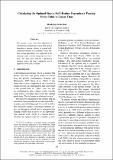Calculating the optimal step in shift-reduce dependency parsing : from cubic to linear time
Abstract
We present a new cubic-time algorithm to calculate the optimal next step in shift-reduce dependency parsing, relative to ground truth, commonly referred to as dynamic oracle. Unlike existing algorithms, it is applicable if the training corpus contains non-projective structures. We then show that for a projective training corpus, the time complexity can be improved from cubic to linear.
Citation
Nederhof , M J 2019 , ' Calculating the optimal step in shift-reduce dependency parsing : from cubic to linear time ' , Transactions of the Association for Computational Linguistics , vol. 7 , pp. 283-296 . https://doi.org/10.1162/tacl_a_00268
Publication
Transactions of the Association for Computational Linguistics
Status
Peer reviewed
ISSN
2307-387XType
Journal article
Collections
Items in the St Andrews Research Repository are protected by copyright, with all rights reserved, unless otherwise indicated.

